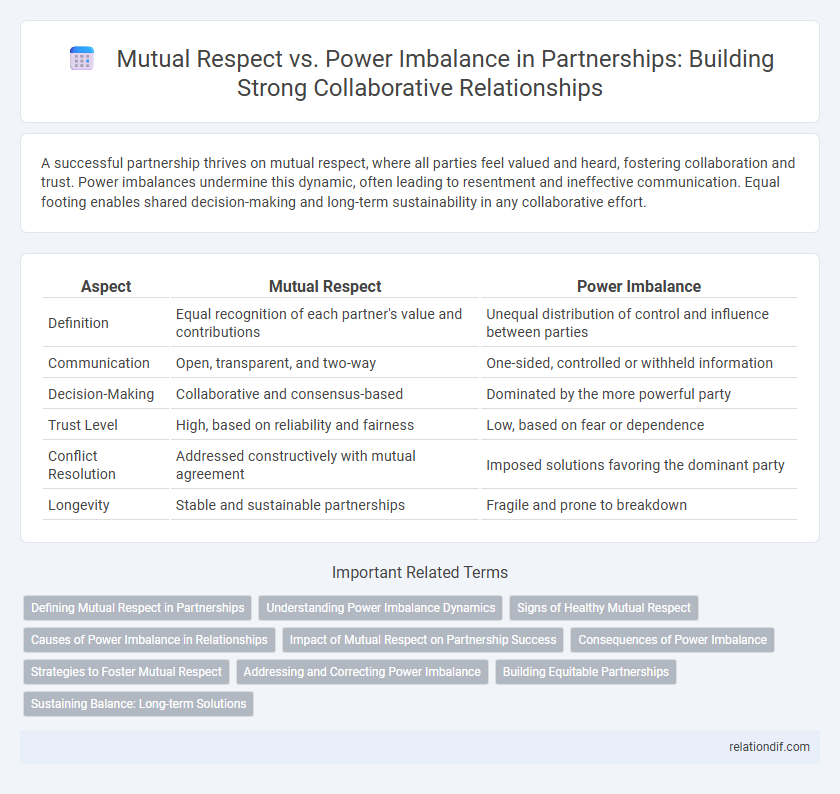A successful partnership thrives on mutual respect, where all parties feel valued and heard, fostering collaboration and trust. Power imbalances undermine this dynamic, often leading to resentment and ineffective communication. Equal footing enables shared decision-making and long-term sustainability in any collaborative effort.
Table of Comparison
| Aspect | Mutual Respect | Power Imbalance |
|---|---|---|
| Definition | Equal recognition of each partner's value and contributions | Unequal distribution of control and influence between parties |
| Communication | Open, transparent, and two-way | One-sided, controlled or withheld information |
| Decision-Making | Collaborative and consensus-based | Dominated by the more powerful party |
| Trust Level | High, based on reliability and fairness | Low, based on fear or dependence |
| Conflict Resolution | Addressed constructively with mutual agreement | Imposed solutions favoring the dominant party |
| Longevity | Stable and sustainable partnerships | Fragile and prone to breakdown |
Defining Mutual Respect in Partnerships
Mutual respect in partnerships involves recognizing and valuing each partner's contributions, perspectives, and boundaries, creating an equitable foundation for collaboration. It contrasts with power imbalance, where one party dominates decision-making, potentially leading to conflict and diminished trust. Defining mutual respect requires establishing clear communication, shared goals, and equal influence to ensure partnership sustainability and success.
Understanding Power Imbalance Dynamics
Understanding power imbalance dynamics is essential in partnerships to foster mutual respect and equitable collaboration. Recognizing how disparities in authority, resources, or influence affect decision-making helps partners address inequalities and promote fairness. Effective communication and shared goals minimize dominance risks, ensuring balanced contributions and sustainable relationships.
Signs of Healthy Mutual Respect
Signs of healthy mutual respect in a partnership include open communication where both parties actively listen and validate each other's perspectives. Equality in decision-making processes ensures that power is balanced and no one dominates the relationship. Consistent support for each other's goals and boundaries reflects genuine regard and fosters long-term trust.
Causes of Power Imbalance in Relationships
Power imbalance in relationships often stems from unequal access to resources, such as financial assets or social connections, leading one partner to dominate decision-making processes. Cultural norms and gender roles can further exacerbate disparities, reinforcing authoritative behaviors and limiting open communication. Psychological factors, including insecurity or past trauma, also contribute to controlling dynamics, undermining mutual respect and cooperation.
Impact of Mutual Respect on Partnership Success
Mutual respect fosters open communication, trust, and collaboration, which are essential for partnership success. Power imbalances often lead to resentment and reduced cooperation, undermining shared goals and long-term sustainability. Studies show partnerships grounded in mutual respect achieve higher innovation rates and operational efficiency.
Consequences of Power Imbalance
A power imbalance in partnerships often leads to diminished trust and reduced cooperation, hindering effective collaboration. Such disparities can foster resentment and communication breakdowns, ultimately weakening the partnership's stability. Persistent inequalities may result in one party dominating decisions, causing long-term damage to mutual goals and shared success.
Strategies to Foster Mutual Respect
Strategies to foster mutual respect in partnerships include clear communication, active listening, and equitable decision-making processes. Establishing transparent roles and responsibilities reduces power imbalances by ensuring all parties have a voice and agency. Regular feedback loops and conflict resolution mechanisms promote trust and reinforce a balanced, respectful collaboration.
Addressing and Correcting Power Imbalance
Addressing and correcting power imbalance in partnerships requires open communication and equitable decision-making processes to ensure mutual respect is maintained. Implementing transparent roles and responsibilities, along with regular feedback mechanisms, fosters trust and reduces dominance by any party. Prioritizing shared goals and recognizing each partner's unique contributions help create a balanced and collaborative environment.
Building Equitable Partnerships
Building equitable partnerships requires prioritizing mutual respect over power imbalances to foster trust and collaboration. Transparent communication and shared decision-making empower all stakeholders, ensuring equal contribution and benefit. Addressing disparities proactively creates sustainable relationships that promote fairness and long-term success.
Sustaining Balance: Long-term Solutions
Sustaining balance in partnerships requires addressing power imbalances by fostering mutual respect and equitable decision-making. Implementing transparent communication channels and shared goals strengthens trust and ensures long-term collaboration. Regularly reassessing roles and responsibilities helps maintain fairness and adapt to evolving dynamics for enduring partnership success.
mutual respect vs power imbalance Infographic

 relationdif.com
relationdif.com